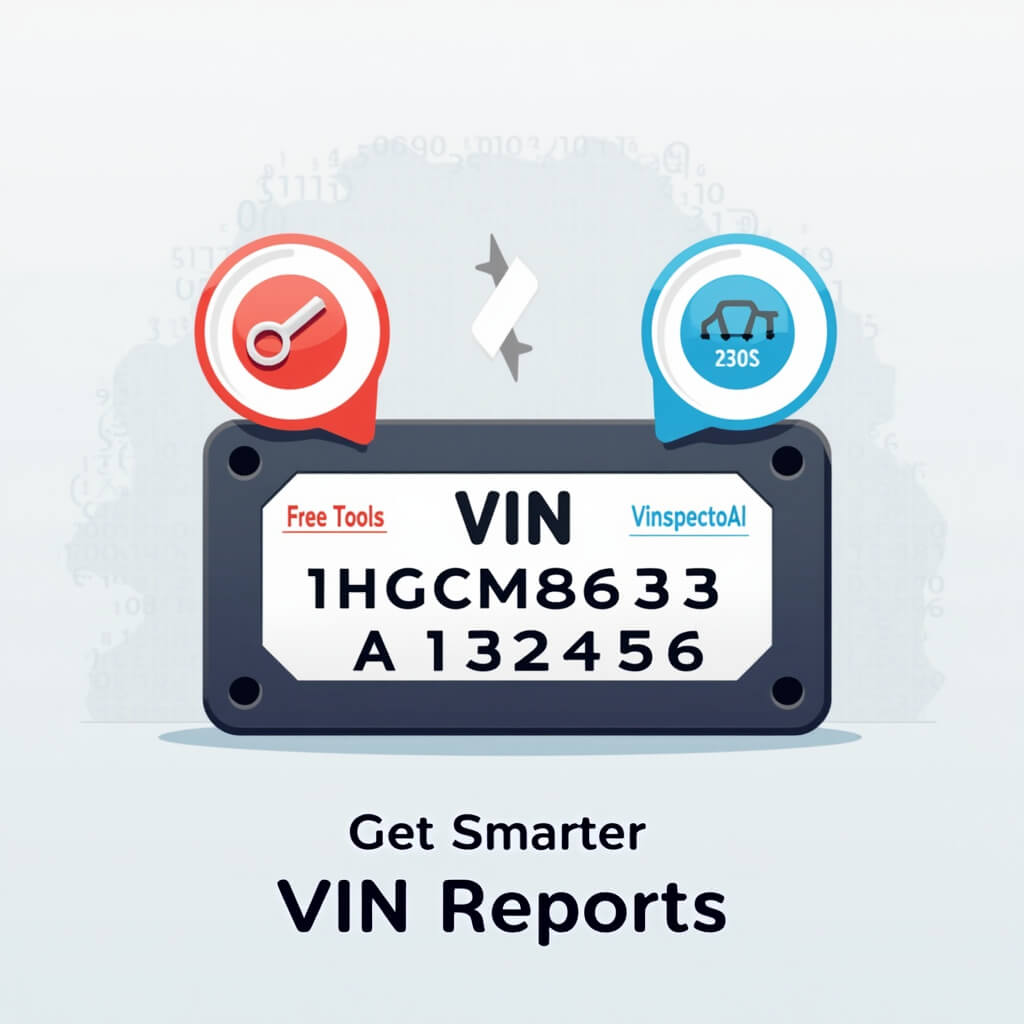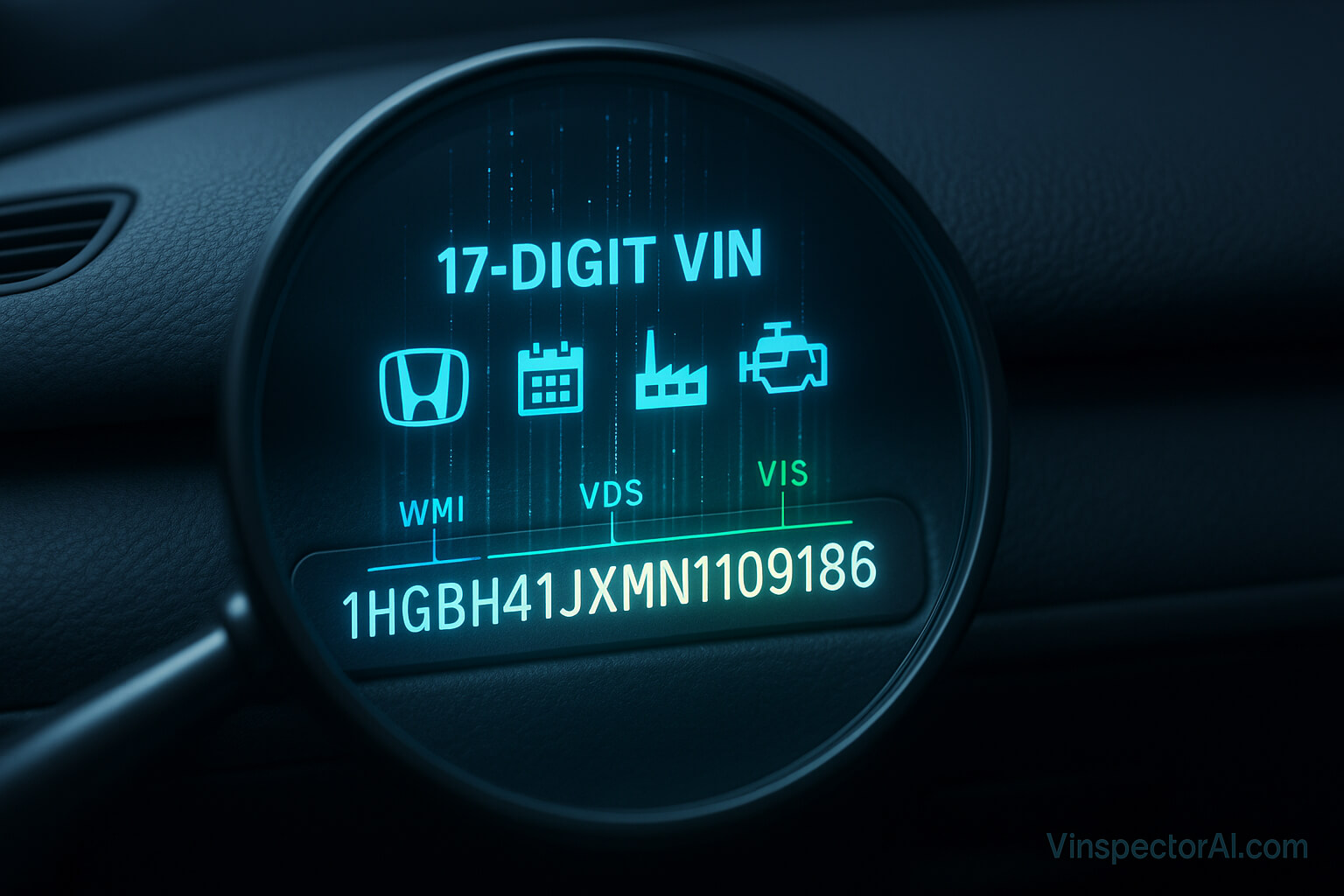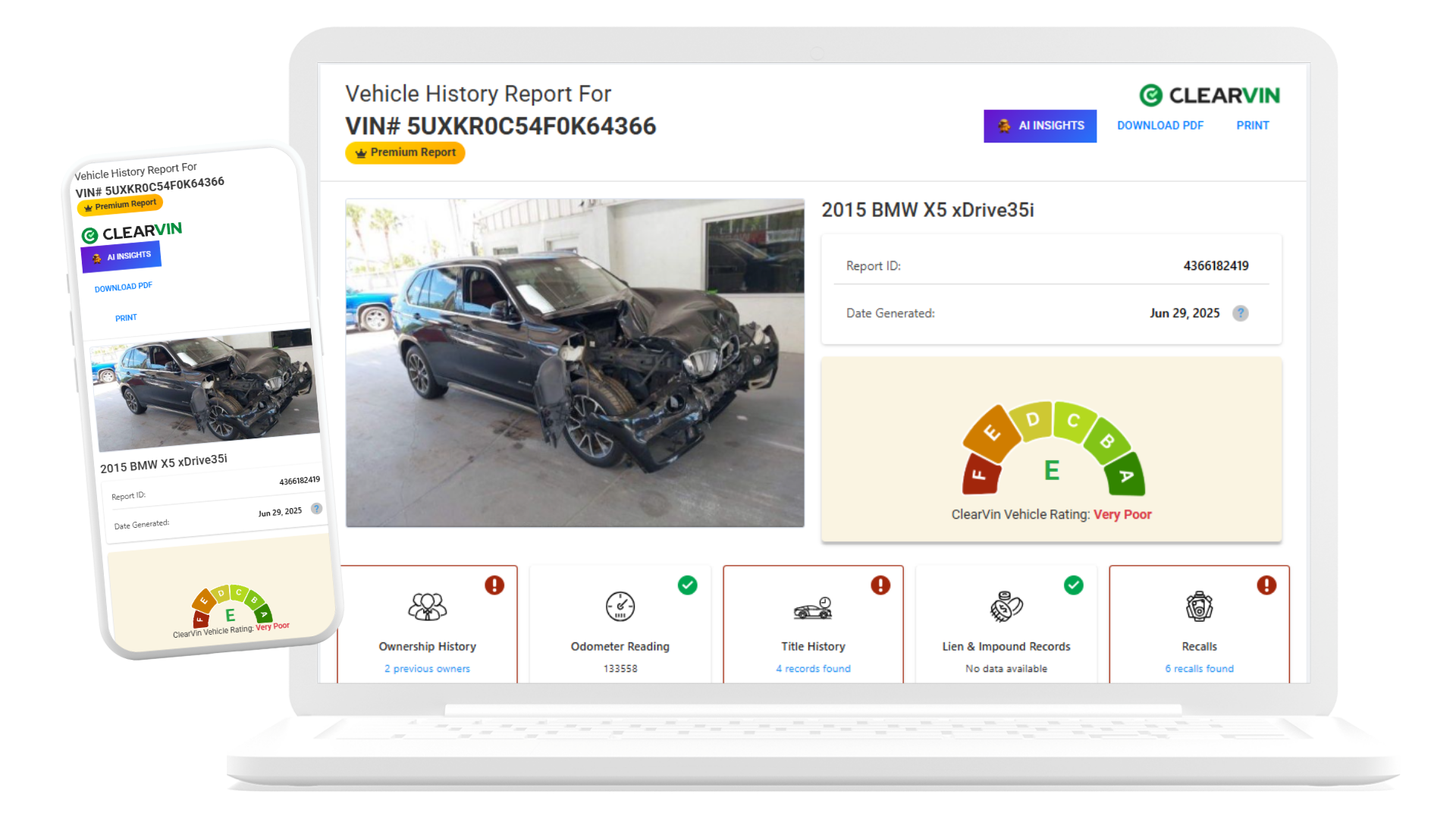
Free or Paid VIN Check? How VinspectorAI Beats Both
VIN Decoder Showdown: Free Tools vs Paid Reports Compared and Why VinspectorAI Offers the Best of Both Worlds
When shopping for a used car, many buyers turn to VIN decoders to understand a vehicle’s history. With so many free tools and paid reports available, knowing which option to trust can be overwhelming. The main difference between free and paid VIN decoders lies in the depth, accuracy, and reliability of the information provided.
Some free tools offer basic data, while paid reports often give more detailed insights such as accident history and title issues. However, neither approach is perfect for every user or budget. VinspectorAI positions itself as a balanced solution, providing thorough reports with transparent methods—so buyers don't have to choose between affordability and accuracy.
Understanding VIN Decoders
A Vehicle Identification Number (VIN) decoder reveals vital details about a vehicle by analyzing its unique 17-digit code. This process helps buyers, sellers, and automotive professionals access important specifications and history facts.
What Is a VIN Decoder?
A VIN decoder is a tool—often available online, as software, or through a mobile app—that interprets the unique 17-character code assigned to every vehicle manufactured since 1981. These characters contain embedded information regarding the car’s manufacturer, model, year, location of manufacture, engine type, and body style.
By entering the VIN, users can quickly obtain basic vehicle details. Some decoders offer additional features, like links to recall information or build sheets, but the primary function is translating the VIN’s coded data into readable text. This tool is widely used for verifying vehicle descriptions, ensuring accuracy in sales listings, and investigating used cars.
How VIN Decoding Works
VIN decoding starts by splitting the code into standard segments. The first three digits (World Manufacturer Identifier) identify the automaker and country. The next six (Vehicle Descriptor Section) detail the vehicle’s model, body, and engine. The final eight (Vehicle Identifier Section) reveal information such as serial number and production sequence.
Most decoders compare this data against official databases and manufacturer records to generate a report. Advanced decoders might also integrate with accident, title, and service record databases, providing a broader view of a vehicle’s background. The accuracy and depth of information depend on the source and completeness of the databases that the decoder can access.
Overview of Free VIN Decoder Tools
Free VIN decoder tools provide users with basic information about a vehicle, usually enough for casual checks or initial research. These services are readily accessible online and typically deliver instant results without cost, but often prioritize general data over deeper reporting.
Popular Free VIN Decoder Options
Some of the most widely used free VIN decoder tools include:
- NHTSA VIN Decoder: Run by the National Highway Traffic Safety Administration, it offers reliable data sourced directly from manufacturers.
These platforms are favored for their no-cost, no-registration approach, and widespread compatibility with most U.S. vehicles. Some industry forums and dealerships also link to these decoders to help users access basic vehicle information quickly.
Typical Features Offered by Free Tools
Most free VIN decoders return a snapshot of key vehicle data such as:
- Make, model, year, and trim level
- Engine type and transmission specifications
- Standard features and body style
- Country of origin and manufacturer details
Some tools also list recall status if the VIN is recognized, usually by referencing public databases. Results are generated automatically in seconds, making these tools ideal for quick overviews or double-checking dealership claims.
Common Limitations and Gaps
Free VIN decoders are rarely equipped to supply critical data about a vehicle’s history, such as previous accidents, title brands, or theft records. Their reports may not be updated in real time, and often rely on manufacturer or public government data—not on repair or insurance databases.
Sensitive or detailed information, like lien status, odometer discrepancies, or prior usage as a fleet vehicle, is almost always omitted. This makes free tools insufficient for buyers seeking a comprehensive risk assessment, as they miss key insights needed for confident decision-making.
Many free platforms also lack customer support and do not guarantee data accuracy in case of discrepancies. As a result, they function best as an initial lookup, not as a substitute for a more thorough vehicle history report.
Exploring Paid VIN Report Services
Paid VIN report services stand out by delivering premium features and enhanced data reliability. They offer structured insights that can help buyers and sellers make secure vehicle decisions.
Features Provided by Paid Reports
Paid services often include detailed ownership history, accident records, open recalls, mileage readings, and title checks. These features extend beyond the basic specifications found in free decoders. Users typically receive reports covering service records, salvage status, lien and theft checks, and the number of previous owners.
Some providers also include lists of past sales events, auction records, and repair estimates. Reports may be available in downloadable PDF format, making them easy to share with potential buyers or dealerships. This broad feature set is designed to present a complete picture of a vehicle’s background.
Accuracy and Data Depth
Paid VIN reports generally access multiple proprietary databases and verified sources. They aggregate official data from insurance companies, DMVs, auction houses, and manufacturer records, increasing trust in the information delivered.
The depth of data in these reports helps users identify hidden issues, such as undisclosed accidents or odometer tampering. While no report can guarantee 100% accuracy, paid reports reduce the chance of missing key details by compiling information from a wider range of sources compared to free tools.
Data Sources and Reliability Compared
Accurate VIN decoding depends on the depth, quality, and freshness of the data involved. Free and paid solutions often differ significantly in how they obtain and maintain this essential information.
Where Free Tools Get Their Data
Free VIN decoder tools usually rely on public databases, manufacturer press releases, and open-source resources.
These tools tend to use static datasets that are updated infrequently. As a result, they may not capture recent recalls, service bulletins, or model-year changes.
Key points to watch for with free options:
- Primary sources: NHTSA, OEM press kits, basic government registries
- Limitations: Missing historical data, infrequent updates, incomplete specs
- Result: Basic information such as year, make, and model is usually accurate, but deeper details (options, prior accidents) are often incomplete.
How Paid Services Collect Information
Paid VIN report providers often invest in acquiring access to proprietary and commercial data feeds.
They typically source information from insurance records, dealership service databases, auction listings, and DMV records. This allows paid reports to include accident history, odometer rollbacks, recalls, and ownership changes.
Unlike most free tools, paid services update their databases daily or weekly. This frequent data refresh adds reliability when it comes to recent events or transactions affecting the vehicle.
Risks of Outdated or Incomplete Data
Free and paid decoders can both suffer from gaps or lag in their data, though reasons differ.
Free tools are especially prone to outdated content if public databases haven’t been updated or if their internal refresh cycles are slow. Even some paid services can miss events if a source hasn’t reported promptly or if data-sharing agreements are fragmented.
Buyers relying on older or patchy data face several risks:
- Undisclosed accident history
- Missed manufacturer recalls
- Hidden title issues (e.g., salvage, theft recovery)
Due diligence demands awareness of these potential blind spots and cross-verifying critical details through multiple sources when possible.
Cost Versus Value in VIN Decoding
Choosing the right VIN decoder can be a matter of balancing what you want to spend against the level of detail and reliability needed. Free tools and paid reports each serve different needs, offering unique trade-offs in features, accuracy, and depth.
When Is Free Good Enough?
Free VIN decoding tools are accessible and fast for basic information needs. They typically show key details like make, model, engine type, body style, and model year. For routine checks or quick verifications—such as confirming basic specs on a vehicle listing—these tools can be sufficient.
Strengths of free tools:
- No registration or payment required
- Immediate access to basic vehicle data
- Useful for casual buyers or those browsing options
Limitations:
- May lack up-to-date information (recalls, ownership history)
- Not reliable for accident, theft, or lien records
- Data sources may not be authoritative or comprehensive
For low-risk situations or when only general information is needed, free VIN decoders may save time and money.
Justifying the Price of Paid Reports
Paid VIN reports often pull data from multiple authoritative databases, including insurance claims, government agencies, and manufacturer recalls. This gives a more thorough picture of the vehicle's history, which is crucial for major purchases or for anyone seeking peace of mind.
Key benefits:
- Detailed accident, salvage, and title histories
- Verified odometer readings
- Access to recall and service bulletins
Paid reports can flag hidden problems like flood damage, odometer tampering, or unresolved liens. These insights can save buyers from unexpected costs and legal complications. For used car purchases, dealership negotiations, or fleet acquisitions, the extra expense is often justified by the level of detail and accuracy provided.
User Experience and Accessibility
When comparing VIN decoders, usability and accessibility often determine which tool best supports effective research. Clear navigation, intuitive layout, and understandable results are key to a seamless experience.
Ease of Use: Free vs Paid
Free VIN decoder tools typically offer direct, fast input forms with minimal steps. These interfaces are often simple and allow users to enter a VIN and receive results in seconds. However, some free platforms display ads, use confusing layouts, or require users to solve CAPTCHAs, which can hinder ease of use.
Paid VIN report services usually provide streamlined websites or mobile apps. They prioritize user experience by removing distractions, offering responsive support, and guiding users through each step—for example, VIN input, payment processing, and report delivery. Paid solutions also commonly feature account dashboards to store past searches, making them practical for frequent users.
VinspectorAI combines the simplicity of free tools with the support and smooth navigation expected from a paid service. Its interface is optimized for both desktop and mobile, removing unnecessary barriers and allowing users to focus on the information they need.
Report Clarity and Format
The clarity of VIN reports varies widely. Free tools often present data in basic tables or plain lists, sometimes using technical language without adequate context. This can make it hard for casual users to interpret results quickly.
Paid reports tend to use organized layouts with defined headings, visual aids (such as icons or checkmarks), and summaries followed by details. They may include explanations for each data point, making results more understandable for readers at any experience level.
VinspectorAI structures results in sections with concise descriptions, clear data tables, and easy navigation. Reports are accessible for both first-time and experienced users, providing logical order and plain-language explanations. This reduces confusion and ensures that users can confidently interpret each aspect of the vehicle history.
Privacy and Security Considerations
Privacy and data security are critical when using any VIN decoding tool. Users often provide sensitive information, so understanding how tools handle personal data and potential risks is essential.
Handling of Personal Information
Many VIN decoder platforms—both free and paid—request personal details such as email addresses, phone numbers, or even payment information to generate vehicle reports. The specific data collected and how it is managed can vary significantly between providers.
Reputable paid services typically use encryption protocols and comply with privacy laws like the GDPR or CCPA to protect user data. However, it’s important to check every provider’s privacy policy. Some free tools may share or sell user information to third parties or advertisers, resulting in unsolicited emails or calls.
Always review:
- What personal data is required
- How the data will be used
- Whether data is stored securely
- If and how data is shared with other parties
Failing to investigate these points can leave users exposed to privacy breaches.
Risks with Free and Paid Services
Free VIN decoding services often fund their operations through advertising or data monetization. Users may face risks such as data mining, spam, or targeted ads. There is also a risk that data might be exposed in the event of a security flaw, as some free services invest less in cybersecurity.
Paid services usually have more robust security measures and less incentive to resell user information. However, not all paid services are equal—some may still collect more data than necessary or have unclear practices regarding user privacy.
Potential risks include:
- Identity theft from insecure platforms
- Data reselling without user knowledge
- Exposure to scams via phishing links in suspicious reports
It is important for users to research and select services that prioritize data protection.
Introducing VinspectorAI as a Balanced Solution
VinspectorAI addresses the common challenges found in both free VIN decoders and paid reporting services by merging affordability with in-depth data. It is designed for users who want more information than a free tool can provide, but do not need to pay premium prices for overpriced extras.
How VinspectorAI Combines Free and Paid Benefits
VinspectorAI delivers essential VIN data—such as make, model, engine type, and manufacturing details—with no charge. This free tier matches most basic decoders in scope and is easy to access.
When users need deeper insights, VinspectorAI offers enhanced reports at a modest cost. These pay-as-you-go upgrades include accident history, theft records, mileage rollbacks, and previous ownership where available. Pricing is transparent; there are no hidden fees or forced subscriptions.
Key free features:
- Decode standard VIN info
- Emissions and safety recalls
- Factory options per vehicle
Advanced paid features:
- Detailed title history
- Market valuation
- Maintenance and registration events
Unique Features of VinspectorAI
VinspectorAI uses a hybrid data approach, sourcing information from national registries, insurance providers, and reputable market databases. This reduces missing data and helps maintain accuracy.
A standout feature is the real-time update capability. When new records are released (such as a recently reported accident), the database reflects changes promptly. VinspectorAI’s user interface is structured for clarity—presenting data in tables and clear lists.
Why Choose VinspectorAI
VinspectorAI is suitable for private buyers, sellers, and dealerships seeking clear, reliable data at fair pricing–eliminating common pain points users face with both free and expensive paid tools. The pay-per-report structure removes the risk of recurring charges.
Customer support is accessible and straightforward, assisting with data clarity or usage questions. VinspectorAI places high priority on privacy; personal data is not stored or shared.
For anyone needing a middle ground between limited free tools and expensive paid reports, VinspectorAI offers thoroughness, accuracy, and value without complication or extra costs.
Conclusion
Both free VIN decoder tools and paid vehicle history reports offer unique benefits and drawbacks. Free tools are easily accessible and provide quick basic details, but may lack depth and up-to-date information. Paid reports are more comprehensive, but the costs can be prohibitive for frequent users or dealerships.
VinspectorAI bridges the gap, delivering balanced coverage and up-to-date information at a reasonable cost. Its platform is clear, direct, and user-friendly, aiding both one-time buyers and frequent users in making informed decisions.
Choosing a VIN tool depends on budget, detail required, and user goals. VinspectorAI stands as a practical option for those seeking reliable vehicle details without overpaying.
Uncover Complete Vehicle History Reports
Discover critical vehicle information before you buy. Our VIN decoder reveals accident records, title status, recalls, and service history to help you make informed decisions.
Related Articles
Explore Tags
More from Vehicle Reviews

Decode your VIN number like an expert! Learn what each digit means and uncover your vehicle's hidden history. Get a free VIN check at VinspectorAI.com

Spot a flood-damaged car before you buy. Check VIN history for hurricane damage, salvage titles, and hidden risks. Avoid costly repairs with a full vehicle report.

Explore the fascinating history of cars, groundbreaking innovations, and future trends like electric vehicles and autonomous driving. Discover how automobiles have transformed our world
